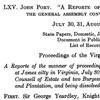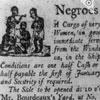An important development, and one welcomed by land-hungry settlers, was the passage of a new charter for the Virginia Company. The land reform measures of the 1618 “Greate Charter” helped transform the Virginia colony from a military outpost into a self-sustaining agricultural colony. Another important result of the charter was the creation of the Virginia General Assembly in 1619 -- the first representative legislature in the Americas. As you read the following excerpt from the first assembly of Burgesses in 1619, consider the implications the "Greate Charter" had not only for agriculture, but also labor, colonist-Indian relations, and the colony's legal system.
John Pory, "A Reporte in the Manner of Proceeding in the General Assembly Convened at James City," July 30, 31, August 2, 3, 4, 1619
Having thus prepared them he [the Speaker of the General Assembly] read over unto them [the Burgesses] the greate Charter, or commission of privileges, orders and laws, sent by Sir George Yeardley out of Englande. . . .
Here begin the lawes drawen out of the Instructions given by his Maties Counsell of Virginia in England to my lo: la warre, Captain Argall and Sir George Yeardley, knight.
By this present General Assembly be it enacted that no injury or oppression be wrought by the English against the Indians whereby the present peace might be disturbed and antient quarrells might be revived. . . .
As touching the instruction of drawing some of the better disposed of the Indians to converse with our people and to live and labour amongst them, the Assembly who knowe well their dispositions thinke it fitte to enjoin, least to counsell those of the Colony, neither utterly to reject them nor yet to drawe them to come in. . . . they are a most trecherous people and quickly gone when they have done a villany. . . .
Be it enacted by this present assembly that for laying a surer foundation of the conversion of the Indians to Christian Religion, eache towne, citty, Borrough, and particular plantation do obtaine unto themselves by just means a certine number of the natives' children to be educated by them in true religion and civile course of life . . .
As touching the business of planting corne this present Assembly doth ordain that yeare by yeare all and every householder and householders have in store for every servant he or they shall keep, and also for his or their owne persons . . . one spare barrell of corne, to be delivered out yearly . . . For the neglecte of which duty he shalbe subjecte to the censure of the Governor and Counsell of Estate. Provided always that the first yeare of every newe man this lawe shall not be of force.
About the plantation of Mulbery trees, be it enacted that every man as he is seatted upon his division, doe for severn yeares together, every yeare plante and maintaine in growte six Mulberry trees at the least . . .
Be it farther enacted as concerning Silke-flaxe, that those men that are upon their division or setled habitation doe this next yeare plante and dresse 100 plantes . . .
For hempe also both English and Indian and for English flax and Aniseeds, we do require and enjoine all householders of this Colony that have any of those seeds to make tryal thereof the nexte season.
Moreover be it enacted by this present Assembly, that every householder doe yearly plante and maintaine ten vines untill they have attained to the art and experience of dressing a Vineyard either by their owne industry or by the Instruction of some Vigneron. . . .
Be it further ordained by this General Assembly . . . that all contractes made in England between the owners of the lande and their Tenants and Servantes which they shall sende hither, may be caused to be duely performed, and that the offenders be punished as the Governour and Counsell of Estate shall thinke just and convenient.
Be it established also by this present Assembly that no crafty or advantagious means be suffered to be put in practise for the inticing awaye the Tenants or Servants of any particular plantation from the place where they are seatted. And that it shalbe the duty of the Governor and Counsell of Estate most severely to punish both the seducers and the seduced, and to returne these latter into their former places. . . .
A thirde sorte of lawes, suche as may issue out of every man's private conceipte.
It shalbe free for every man to trade with the Indians, servants onely excepted, upon paine of whipping . . .
That no man doe sell or give any of the greatter howes to the Indians . . .
That no man do sell or give any Indians any piece shott or boulder, or any other armes, offensive or defensive upon paine of being held a Traytour to the Colony, and of being hanged as soon as the facte is proved, without all redemption.
Under the new charter, the Virginia Company offered land grants of 100 acres per share to stockholders and to any settlers who had lived in Virginia for more than two years. It further institutionalized the headright system that gave 50 acres to anyone paying their own way to Virginia, and an additional 50 acres for every additional person he or she brought to the colony.
The 1618 charter fundamentally changed the concept of land ownership. Until 1618, the Virginia Company owned the land and settlers signed a contract to work for the Company for 7 years. After that time they received a portion of the profits. After 1618, though, individual settlers could own land themselves. Landownership served as a great incentive for attracting settlers. It also fueled a system of indentured servitude, in which landowners paid for a worker’s passage from England in exchange for four to seven years of labor. The indenture system formed the backbone of Virginia’s economic system for many years.
Source: John Pory, "A Reporte in the Manner of Proceeding in the General Assembly Convened at James City," July 30, 31, August 2, 3, 4, 1619 in The Thomas Jefferson Papers Series 8. Virginia Records Manuscripts. 1606-1737. Transcript accessed at Library of Congress, American Memory Timeline, Colonial Settlement, 1600s-1763.












